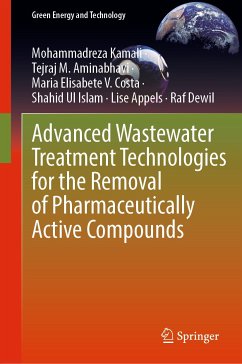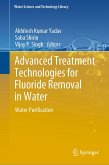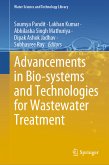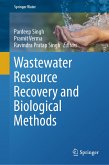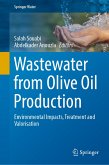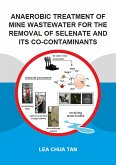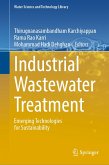Advanced Wastewater Treatment Technologies for the Removal of Pharmaceutically Active Compounds (eBook, PDF)


Alle Infos zum eBook verschenken

Advanced Wastewater Treatment Technologies for the Removal of Pharmaceutically Active Compounds (eBook, PDF)
- Format: PDF
- Merkliste
- Auf die Merkliste
- Bewerten Bewerten
- Teilen
- Produkt teilen
- Produkterinnerung
- Produkterinnerung

Hier können Sie sich einloggen

Bitte loggen Sie sich zunächst in Ihr Kundenkonto ein oder registrieren Sie sich bei bücher.de, um das eBook-Abo tolino select nutzen zu können.
This book reports on the treatment of waters and wastewaters with contaminants of emerging concern such as pharmaceutically active compounds. It shows how to prevent the contamination of the environment with such pollutants in the content of effluents. This book reviews various physico-chemical and biological methods that have been developed in order to deal with the polluted effluents. It also evaluates the already developed technologies regarding the sustainability criteria. The chapters discuss technical aspects and put the spotlight on the sustainability aspects of the water and wastewater treatment technologies.…mehr
- Geräte: PC
- ohne Kopierschutz
- eBook Hilfe
- Größe: 9.99MB
![Advanced Treatment Technologies for Fluoride Removal in Water (eBook, PDF) Advanced Treatment Technologies for Fluoride Removal in Water (eBook, PDF)]() Advanced Treatment Technologies for Fluoride Removal in Water (eBook, PDF)105,95 €
Advanced Treatment Technologies for Fluoride Removal in Water (eBook, PDF)105,95 €![Application of Artificial Intelligence in Wastewater Treatment (eBook, PDF) Application of Artificial Intelligence in Wastewater Treatment (eBook, PDF)]() Application of Artificial Intelligence in Wastewater Treatment (eBook, PDF)161,95 €
Application of Artificial Intelligence in Wastewater Treatment (eBook, PDF)161,95 €![Advancements in Bio-systems and Technologies for Wastewater Treatment (eBook, PDF) Advancements in Bio-systems and Technologies for Wastewater Treatment (eBook, PDF)]() Advancements in Bio-systems and Technologies for Wastewater Treatment (eBook, PDF)113,95 €
Advancements in Bio-systems and Technologies for Wastewater Treatment (eBook, PDF)113,95 €![Wastewater Resource Recovery and Biological Methods (eBook, PDF) Wastewater Resource Recovery and Biological Methods (eBook, PDF)]() Wastewater Resource Recovery and Biological Methods (eBook, PDF)105,95 €
Wastewater Resource Recovery and Biological Methods (eBook, PDF)105,95 €![Wastewater from Olive Oil Production (eBook, PDF) Wastewater from Olive Oil Production (eBook, PDF)]() Wastewater from Olive Oil Production (eBook, PDF)121,95 €
Wastewater from Olive Oil Production (eBook, PDF)121,95 €![Anaerobic Treatment of Mine Wastewater for the Removal of Selenate and its Co-Contaminants (eBook, PDF) Anaerobic Treatment of Mine Wastewater for the Removal of Selenate and its Co-Contaminants (eBook, PDF)]() Lea TanAnaerobic Treatment of Mine Wastewater for the Removal of Selenate and its Co-Contaminants (eBook, PDF)110,95 €
Lea TanAnaerobic Treatment of Mine Wastewater for the Removal of Selenate and its Co-Contaminants (eBook, PDF)110,95 €![Industrial Wastewater Treatment (eBook, PDF) Industrial Wastewater Treatment (eBook, PDF)]() Industrial Wastewater Treatment (eBook, PDF)113,95 €
Industrial Wastewater Treatment (eBook, PDF)113,95 €-
-
-
Dieser Download kann aus rechtlichen Gründen nur mit Rechnungsadresse in A, B, BG, CY, CZ, D, DK, EW, E, FIN, F, GR, HR, H, IRL, I, LT, L, LR, M, NL, PL, P, R, S, SLO, SK ausgeliefert werden.
- Produktdetails
- Verlag: Springer International Publishing
- Seitenzahl: 239
- Erscheinungstermin: 20. Februar 2023
- Englisch
- ISBN-13: 9783031208065
- Artikelnr.: 67487439
- Verlag: Springer International Publishing
- Seitenzahl: 239
- Erscheinungstermin: 20. Februar 2023
- Englisch
- ISBN-13: 9783031208065
- Artikelnr.: 67487439
- Herstellerkennzeichnung Die Herstellerinformationen sind derzeit nicht verfügbar.
Tejraj M. Aminabhavi is a director of Research at School of Advanced Sciences, KLE Technological University, Hubballi, India, and a diamond jubilee professor for life at Karnatak University, Dharwad, India, in addition to an honorary visiting professor at Macquaire University, Sydney, Australia. Aminabhavi obtained Ph.D. in polymer science from the University of Texas, Austin, Texas, USA; he has over 45 years of experience in academia, teaching, research, and industry. He works in the area of membrane transport processes, molecular modeling of polymer surfaces, wastewater treatment technologies, drug delivery polymers, and sustainable environmental engineering. Aminabhavi received Nikkei Asia Award in 2013 from Japan, Kwarizmi International Award from Iran in 2009, and CIPET Award in 2014 from ministry of fertilizers and chemicals, India.
Elisabete Costa is an assistant professor of the University of Aveiro (UA), Portugal, at the Department of Materials and Ceramic Engineering (DEMaC), and a researcher of CICECO, Aveiro Materials Institute. She has a Chemical Engineering degree (Coimbra University) and a Ph.D. in Materials Science and Engineering (UA). Her teaching activities have covered different engineering courses and the supervision of student's research projects and industry internships. She held several institutional coordination positions, among which a coordinator of DEMaC Scientific Council, a master in Materials Science and Engineering, and a director of Doctoral Program in Nanosciences and Nanotechnology. Her current R&D interests encompass a wide range of materials regarding composition, dimensionality, and properties, for different applications (electronics, biomedical, and environment), i.e., synthesis and processing of nanoparticles, nanostructures, thin/thick films, single crystals, ceramic bulk materials and ceramic polymer composites, and characterization of their structure, microstructure, mechanical, dielectric, piezoelectric, and ferroelectric properties.
Shahid-ul-Islam is a fulbright research scientist at the University of California (Davis), California, USA. Before joining UC, he was working as a principal scientist at the Indian Institute of Technology Delhi, India, where he led projects funded by the Science and Engineering Research Board (DST-SERB) and the Council of Scientific and Industrial Research (CSIR), Govt. of India. His research goals are interdisciplinary, with a main emphasis on green engineering, sustainable chemistry, and the design and development of biologically active materials and surfaces for different application sectors. He is a fellow of the International Society for Development and Sustainability (ISDS), Japan; a member of many groups, including the American Chemical Society (USA); and is a life member of the Asian Polymer Association.
Lise Appels is the head of the Process and Environmental Technology Lab (PETLab), which focusses on resource recovery and the treatment of aqueous waste and side streams. Within PETLab, she coordinates the research line on optimization of mixed-culture microbial processes toward the production of energy carriers and renewable chemicals, using (polluted) organic side streams as feedstock. She is a subject editor of Renewable Energy (IF= 8.001), EBM of various international journals (Renewable and Sustainable EnergyReviews, Chemical Engineering Journal, Energies, ...), and a regular reviewer for numerous international journals.
Raf Dewil received his M.Sc. in Chemical Engineering Science from the University of Leuven (KU Leuven - Belgium) in 2003. Between 2003 and 2006, he carried out Ph.D. research at the University of Antwerp (Belgium). He was awarded his Ph.D. in Bioscience Engineering (Environmental Engineering) at this university in 2006. Following a one-year postdoctoral fellowship at the University of Antwerp, he was appointed as an assistant professor at KU Leuven association in November 2007, followed by a part-time associated professorship at the Chemical Engineering Department of KU Leuven in 2009. In 2014, he became a full-time associate professor at the same department. In 2018, he was promoted to professor. At KU Leuven, Raf Dewil leads a research group of about 20 members, mainly working on the treatment of hazardous waste(water) streams and sustainable resource recovery.
